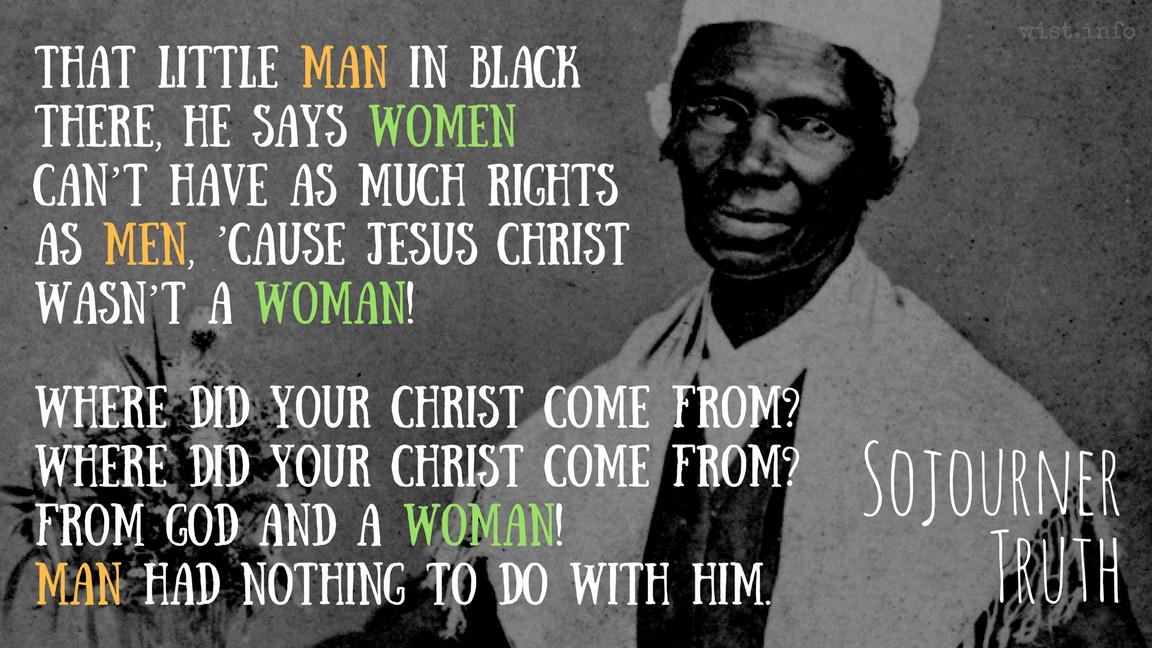In our time we have come to live with moments of great crisis. Our lives have been marked with debate about great issues; issues of war and peace, issues of prosperity and depression. But rarely in any time does an issue lay bare the secret heart of America itself. Rarely are we met with a challenge, not to our growth or abundance, our welfare or our security, but rather to the values and the purposes and the meaning of our beloved Nation.
The issue of equal rights for American Negroes is such an issue. And should we defeat every enemy, should we double our wealth and conquer the stars, and still be unequal to this issue, then we will have failed as a people and as a nation.Lyndon B. Johnson (1908-1973) American politician, educator, US President (1963-69)
“The American Promise,” speech to a Joint Session of Congress [06:27] (1965-03-15)
(Source)
Quotations about:
equal rights
Note not all quotations have been tagged, so Search may find additional quotes on this topic.
We will never have true civilization until we have learned to recognize the rights of others.
Since law constitutes the bond of civil society, and the authority of the law is equal, how can the society of citizens be maintained when their condition is not equal? If it be not pleasing to place their wealth on equal footing, and if everyone is endowed with unequal abilities, certainly all of those who are citizens of the same republic ought to have equal rights. For, what is the state but the shared rights of its citizens?
[Quare cum lex sit civilis societatis vinculum, ius autem legis aequale, quo iure societas civium teneri potest, cum par non sit condicio civium? Si enim pecunias aequari non placet, si ingenia omnium paria esse non possunt, iura certe paria debent esse eorum inter se, qui sunt cives in eadem re publica. Quid est enim civitas nisi iuris societas?]
Marcus Tullius Cicero (106-43 BC) Roman orator, statesman, philosopher
De Re Publica [On the Republic, On the Commonwealth], Book 1, ch. 32 / sec. 49 (1.49) (54-51 BC) [tr. @sentantiq (2017)]
(Source)
(Source (Latin)). Alternate translations:
Wherefore as the law is the bond of civil society, and equal rights form that of the law, by what power can a community of citizens be maintained, where their condition is not an equal one? If therefore it is not expedient to equalize fortunes; if the powers of mind cannot be equalized in all, certainly then an equality of rights ought to exist, among those who are citizens of the same republic. For what is a state but a community of rights?
[tr. Featherstonhaugh (1829)]
Wherefore, since the law is the bond of civil society, and the justice of the law equal, by what rule can the association of citizens be held together, if the condition of the citizens be not equal? For if the fortunes of men cannot be reduced to this equality—if genius cannot be equally the property of all—rights, at least, should be equal among those who are citizens of the same republic. For what is a republic but an association of rights?
[tr. Barham (1841)]
Wherefore, since the law is the bond of civil society, and the justice of the law equal, by what rule can the association of citizens be held together, if the condition of the citizens be not equal? For if the fortunes of men cannot be reduced to this equality -- if genius cannot be equally the property of all -- rights, at least, should be equal among those who are citizens of the same republic. For what is a republic but an association of rights?
[tr. Yonge (1853)]
Therefore, since law is the bond which unites the civic association, and the justice enforced by law is the same for all, by what justice can an association of citizens be held together when there is no equality among the citizens? For if we cannot agree to equalize men’s wealth, and equality of innate ability is impossible, the legal rights at least of those who are citizens of the same commonwealth ought to be equal. For what is a State except an association or partnership in justice?
[tr. Keyes (1928)]
Since, then, law is the bond that holds political society together, and since equality of rights is a part of law, by what principle of right can an association of citizens be held together, when the status of these citizens is not equal? For, if it is not thought desirable that property should be equally distributed, and if the natural capacities of all men cannot possibly be equal, yet certainly all who are citizens of the same commonwealth ought to enjoy equal rights in their mutual relations. What, indeed, is a state, if it is not an association of citizens united by law?
[tr. Sabine/Smith (1929)]
Since, then, law is the bond which holds together a community of citizens, and the justice embodied in the law is the same for everyone, by what right can a community of citizens be held together when their status is unequal? If the equalization of wealth is rejected, and the equalization of everybody’s abilities is impossible, legal rights at least must be equal among those who live as fellow-citizens in the same state. For what is a state other than an equal partnership in justice?
[tr. Rudd (1998)]
And therefore, since law is the bond of civil society, and rights under law are equal, then by what right can a society of citizens be held together when the status of citizens is not the same? Even if equality of property is not appealing, and if the mental abilities of all cannot be equal, certainly the rights of all who are citizens of the same commonwealth ought to be equal. What is a state if not the association of citizens under the law?
[tr. Zetzel (1999)]
There is, in fact, no incompatibility between the principles of feminism and the possibility that men and women are not psychologically identical. To repeat: equality is not the empirical claim that all groups of humans are interchangeable; it is the moral principle that individuals should not be judged or constrained by the average properties of their group. In the case of gender, the barely defeated Equal Rights Amendment put it succinctly: “Equality of Rights under the law shall not be denied or abridged by the United States or any state on account of sex.” If we recognize this principle, no one has to spin myths about the indistinguishability of the sexes to justify equality. Nor should anyone invoke sex differences to justify discriminatory policies or to hector women into doing what they don’t want to do.
Steven Pinker (b. 1954) Canadian-American cognitive psychologist, linguist, author
The Blank Slate, Part 5, ch. 18 (2002)
(Source)
I can hardly believe that any person can be found who will not admit that every one of these provisions is just. They are all asserted, in some form or other, in our Declaration or organic law. But the Constitution limits only the action of Congress, and is not a limitation on the States. This amendment supplies that defect, and allows Congress to correct the unjust legislation of the States, so far that the law which operates upon one man shall operate equally upon all. Whatever law punishes a white man for a crime shall punish the black man precisely in the same way and to the same degree. Whatever law protects the white man shall afford equal protection to the black man. Whatever means of redress is afforded to one shall be afforded to all. Whatever law allows the white man to testify in court shall allow the man of color to do the same. These are great advantages over their present codes.
James A. Garfield (1831-1881) US President (1881), lawyer, lay preacher, educator
Speech, House of Representatives (4 Apr 1871)
(Source)
On the proposed 14th Amendment to the US Constitution, which forbade to each state the ability to "deny to any person within its jurisdiction the equal protection of the laws."
People always ask if a woman can be a wife and mother and have a career at the same time. Why don’t they ask if she can be a hostess, chauffeur, cook, gardener, nurse, seamstress, social secretary, purchasing agent, baby machine, and courtesan — and a wife and a mother, too?
That little man in black there, he says women can’t have as much rights as men, ’cause Jesus Christ wasn’t a woman! Where did your Christ come from? Where did your Christ come from? From God and a woman! Man had nothing to do with Him.
Sojourner Truth (1797-1883) American abolitionist, women's rights activist [b. Isabella Baumfree]
“Ain’t I A Woman?” speech, Women’s Convention, Akron, Ohio (1851)
(Source)
A city is in many respects a great business corporation, but in other respects it is enlarged housekeeping. … May we not say that city housekeeping has failed partly because women, the traditional housekeepers, have not been consulted as to its multiform activities?
And by the way, in the the new Code of Laws which I suppose it will be necessary for you to make I desire you would Remember the Ladies, and be more generous and favourable to them than your ancestors. Do not put such unlimited power into the hands of the Husbands. Remember all Men would be tyrants if they could. If particular care and attention is not paid to the Ladies we are determined to foment a Rebellion, and will not hold ourselves bound by any Laws in which we have no voice, or Representation.
I think the authors of that notable instrument intended to include all men, but they did not mean to declare all men equal in all respects. They did not mean to say all men were equal in color, size, intellect, moral development, or social capacity. They defined with tolerable distinctness in what they did consider all men created equal — equal in “certain inalienable rights, among which are life, liberty, and the pursuit of happiness.” This they said, and this they meant. They did not mean to assert the obvious untruth that all were then actually enjoying that equality, or yet that they were about to confer it immediately upon them. In fact, they had no power to confer such a boon. They meant simply to declare the right, so that the enforcement of it might follow as fast as circumstances should permit. They meant to set up a standard maxim for free society which should be familiar to all, constantly looked to, constantly labored for, and even, though never perfectly attained, constantly approximated, and thereby constantly spreading and deepening its influence, and augmenting the happiness and value of life to all people, of all colors, everywhere.
All, too, will bear in mind this sacred principle, that though the will of the majority is in all cases to prevail, that will to be rightful must be reasonable; that the minority possess their equal rights, which equal law must protect, and to violate would be oppression.
Thomas Jefferson (1743-1826) American political philosopher, polymath, statesman, US President (1801-09)
Inaugural Address (4 Mar 1801)
(Source)
For as the problem of civil rights has grown in urgency it has also grown in complexity. We must open the doors of opportunity. But we must also equip our people to walk through those doors.
Lyndon B. Johnson (1908-1973) American politician, educator, US President (1963-69)
Speech, National Urban League, New York (1964-12-10)
(Source)
Liberty then I would say that, in the whole plenitude of it’s extent, it is unobstructed action according to our will: but rightful liberty is unobstructed action according to our will, within the limits drawn around us by the equal rights of others. I do not add ‘within the limits of the law’; because law is often but the tyrant’s will, and always so when it violates the right of an individual.
Thomas Jefferson (1743-1826) American political philosopher, polymath, statesman, US President (1801-09)
Letter to Isaac H. Tiffany (4 Apr 1819)
(Source)












